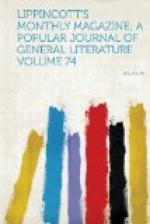The village in which young Moore was executed was soon visited by Sevier with a terrible retribution; and from that day for twenty years his name was a terror among the Cherokees.
Before many months there was a wedding in the fort at Watauga. It was that of John Sevier and the “bonnie Kate,” famous to this day for leaping stockades and six-barred fences. He lived to be twelve years governor of Tennessee and the idol of a whole people. She shared all his love and all his honors; but in her highest estate she was never ashamed of her lowly days, and never tired of relating her desperate leap at Watauga; and, even in her old age, she would merrily add, “I would make it again—every day in the week—for such a husband.”
EDMUND KIRKE.
A PLEASANT SPIRIT.
It was drawing toward nine o’clock, and symptoms of closing for the night were beginning to manifest themselves in Mr. Pegram’s store. The few among the nightly loungers there who had still a remnant of domestic conscience left had already risen from boxes and “kags,” and gathered up the pound packages of sugar and coffee which had served as the pretext for their coming, but which would not, alas! sufficiently account for the length of their stay. The older stagers still sat composedly in the seats of honor immediately surrounding the red-hot stove, and a look of disapproval passed over their faces as Mr. Pegram, opening the door and thereby letting in a blast of cold air upon their legs, proceeded to put up the outside shutters.
“In a hurry to-night, ain’t you, Pegram?” inquired Mr. Dickey, as the proprietor returned, brushing flakes of snow from his coat and shivering expressively.
“Well, not particular,” replied Mr. Pegram, with a deliberation which confirmed his words, “but it’s pretty nigh nine, and Sally she ast me not to be later than nine to-night, for our hired girl’s gone home for a spell, and that makes it kind of lonesome for Sally: the baby don’t count for much, only when he cries, and I’ll do him the justice to say that isn’t often.”
“It’s a new thing for Sally to be scary, ain’t it?” queried Mr. Crumlish, with an expression of mild surprise.
“Well, yes, I may say it is,” admitted Mr. Pegram; “but, you know, we had a kind of a warning, before we moved in, that all wasn’t quite as it should be, and, as bad luck would have it, there was a Boston paper come round her new coat, with a story in it that laid out to be true, of noises and appearances, and one thing and another, in a house right there to Boston, and Sally she says to me, ’If they believe in them things to Boston, where they don’t believe in nothing they can’t see and handle, if all we hear’s true, there must be something in it, and I only wish I’d read that piece before we took the house.’
“I keep a-telling her we’ve neither seen nor heard nothing out of the common, so far, but all she’ll say to that is, ’That’s no reason we won’t;’ and sure enough it isn’t, though I don’t tell her so.”




